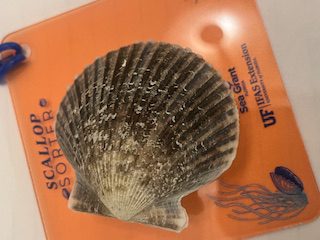The 2024 Pasco County scallop season promised to be a glorious time, that time of year when adults get to enjoy their own Easter egg hunt of sorts. There are lots of tasty morsels hiding among the sea grass blades just waiting to be plucked from the sea floor. Family and friends enjoying time on the water during the summer heat.
So much for that! A surprise Pasco scallop season shut down rocked all those involved. On July 24, the Florida Fish and Wildlife Conservation Commission announced a “temporary” halt to the season, due to the detection of saxitoxin and a critter called Pyrodinium bahamense. There are 13 possible days left, as I write this article, and we are all still wondering if we may get any days scalloping before the season closes.
Pre-season scouting revealed lots of scallops this year in Pasco waters. With the extended season from July 10 to August 18, anyone who is interested should have the opportunity. Many look forward to the economic boost from tourists and locals. Charter captains and boat rental operations especially look forward to this time of year for the added income.
Many of you may recall just a few years ago southern Pasco waters experienced some patchy bouts of red tide that left a tide line of dead fish almost the entire length of the backside of Anclote Key. That put a major damper on the scallop season, as well. The red tide organism, Karenia brevis, produces brevatoxin. This latest organism interfering with our scallop season is Pyrodinium bahamense. It is in the same algae group as Karenia and are known as dinoflagellates, but produces a different neurotoxin called saxitoxin. Saxitoxin is most known for causing paralytic shellfish poisoning (PSP) and can be potentially a serious human health hazard. Filter feeders such as scallops, clams and oysters can bioaccumulate saxitoxin as they ingest Pyrodinium organisms. Blooms of Pyrodinium bahamense are naturally occurring every year in many areas around Florida. Pyrodinium has the ability of bioluminescence and many of the nighttime kayak tours on the Indian River lagoon explore the blue glowing presence of Pyrodinium. FWC routinely monitors for Pyrodinium due to the public health risk.
Like red tide, this toxin producing dinoflagellate thrives in a high nitrogen environment. As the human population grows, increased nutrient input from sanitary systems, fertilizer and runoff can spur increased growth from a whole host of algae, including those that can produce toxins. Some of the saxitoxin positive samples came from the mouth of the Anclote River area, according to reports.
On a scallop conservation note, over the past couple of years, there has been development and promotion of a scallop sorter. Groups like Fl Sea Grant, UF/IFAS and FWC have developed this tool as a way to promote sustainable harvest practices in the scallop population. The basic idea being that if a scallop is small enough to pass through the opening, it should be released to ensure for more growth and reproduction. While not mandatory, all scallopers should try to take part so we all can continue to enjoy an annual scallop season. Pasco County, recently named the Sports Coast, has tourism centers that are distributing the scallop sorters free of charge. I personally had some difficulty locating them initially. Hopefully, the sorters will spread to local bait shops and retailers for free distribution.
Let’s all cross our fingers and hope that the 2024 Pasco Scallop season gets reinstated before the close of the season.
Tight Lines,
Capt. Don
Capt. Don Stansell is a local marine biologist who is an avid outdoorsman, fisherman and conservationist. He enjoys educating people on our coastal and marine environments. His passion for the water and outdoors grew from being raised on the bayous of Slidell, LA and in the Chesapeake Bay area of Annapolis, MD. He has been in sunny

